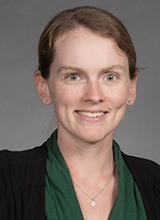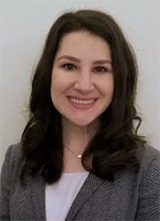Condition: Child and adolescent psychiatry/psychology

Erin Dillon-Naftolin
I am a child and adolescent psychiatrist with experience in delivering evidence based care for youth with psychiatric disorders. My clinical work is primarily in the outpatient setting and I have experience with telehealth, community mental health, consultation to primary care and developing integrated care systems with pediatricians. I am a psychiatrist on the Partnership Access Line, which provides phone consultation regarding diagnosis and treatment to pediatricians and other primary care physicians throughout Washington, Wyoming and Alaska. I have worked as part of an integrated care team by providing consultation in person at Kent-Des Moines and Roosevelt clinics. I have expertise in the treatment of common childhood psychiatric disorders and I am particularly interested in treating anxiety and ADHD. I am also trained in cognitive behavioral therapy (CBT) and dialectical behavioral therapy (DBT) and incorporate this background in my work. I value working collaboratively with patients and their families to make a decision about treatment options based on the best evidence we have for safe and effective treatment.
Academically, I have enjoyed being part of the fellowship training program teaching about Integrated Care and currently co-chair the child and adolescent curriculum for the University of Washington Integrated Care Fellowship.

Cynthia Flynn

Jessica Jenness
Dr. Jenness is a clinical child psychologist and Associate Professor in the Department of Psychiatry and Behavioral Sciences at the University of Washington. She earned her Ph.D. in Clinical Psychology from the University of Denver in 2015. Her past research includes NIMH-funded studies on the neural and behavioral changes that predict treatment response to behavioral activation for depressed adolescents (K23/NARSAD). As the director of the Adolescent Depression and Intervention Innovations (ADII) lab, her recent work focuses on innovative digital treatment approaches to improve adolescent depression care. Current projects include 1) adapting behavioral activation to an online platform, ActivaTeen (R03, NIMH R34); 2) leveraging paraprofessional coaching of video-guided depression care (Garvey Innovation Grant); and 3) developing and testing a digital just-in-time adaptive intervention (Sidekick; NIMH R61) as a first-step adolescent depression treatment within primary care settings. In addition to research, Dr. Jenness is an Attending Psychologist in the Mood and Anxiety Disorders Program at Seattle Children’s Hospital where she primarily treats adolescent depression and suicide. She has also trained mental health professionals at various sites around the US in the use of behavioral activation with adolescents.

Mendy Minjarez

Elizabeth McCauley
Personal Statement
I am a developmental and child clinical psychologist actively engaged in a clinical and research program designed to characterize the development, course, and management of clinical depression in young people. My colleagues and I are engaged in a series of research investigations documenting the developmental pathways of youth with depressive disorders and co-occurring conduct problems, testing the efficacy of a brief intervention, assessment and engagement approach for school-based for school based providers, and adapting and testing behavioral activation as a therapy for depressed adolescents. I am also engaged in a randomized control study assessing the efficacy of Dialectical Behavior Therapy as a treatment for youth with suicidal ideation and behaviors.
I have been actively involved with national and local efforts to disseminate training in evidenced based treatment strategies to child mental health care providers and is currently working with King County Public Health and local school districts to provide training and consultation to school based mental health providers in evidenced based assessment and intervention approaches. In addition to my work focused on depressive disorders, I have extensive experience evaluating and treating children/adolescents and their families who present with a variety of developmental and behavior problems including youth with gender dysphoria and those with disorders of sex development.

Robert Hilt
Robert Hilt, MD is a Professor in the UW Department of Psychiatry and Behavioral Sciences and a psychiatrist at Seattle Children’s Hospital. He is the program director for the Partnership Access Line (PAL), a child mental health consultation service for primary care providers in Washington, Wyoming and Alaska. He is the Program Director for the Medicaid Medication Second Opinion Programs of Wyoming, Washington and Alaska, and Multidisciplinary Team (MDT) Psychiatric Consult Service in Wyoming for children in foster care. He has been involved in several collaborative care projects, in school support projects, and has helped to establish a statewide mental health referral service in Washington. Dr. Hilt’s primary interest is to increase professional collaboration between child psychiatrists and pediatric medical providers, and to increase access to high quality care.

William French
Personal Statement
I am a board certified child and adolescent psychiatrist in the Pediatric Clinic at Harborview, Seattle Children’s Hospital, and Odessa Brown Children’s Clinic in the Division of Psychiatry and Behavioral Medicine.
In my clinical work, I strive to create active partnerships with my patients and their families to achieve the best possible outcomes regardless of their needs and circumstances. I am lucky to have great behavioral health and primary care partners across the different clinics I work in, who are invaluable collaborators in caring for our patients and families.
I am involved in the child and adolescent training program and supervises trainees at several outpatient clinics. My clinical and research interests include integrating mental healthcare into primary care settings, ADHD, disruptive behaviors, aggression, trauma-related disorders, and improving clinical supervision of child and adolescent psychiatry trainees.

Jennifer Cadigan
Personal Statement
Dr. Cadigan is an Assistant Professor and licensed psychologist in the Department of Psychiatry and Behavioral Sciences. She received her Ph.D. from the University of Missouri in 2016 and then completed clinical psychology internship and fellowship at the University of Washington Medical Center. Her program of research focuses on adolescent and young adult health and wellbeing, with an emphasis on the etiology, prevention, and intervention of substance misuse and co-occurring mental health concerns. This work aims to develop, test, and disseminate innovative prevention and intervention programs to reduce substance misuse and improve mental health among adolescents and young adults. This work has included developing and testing programs for young adults who use substances to cope with negative affect and loneliness. Her work has also examined etiological factors related to co-occurring mental health and substance use, including the effects of loneliness, depression, coping motives, social support, solitary substance use, and factors associated with improving access to mental health care. Clinically, she works with adolescents presenting with depression and suicidality at Seattle Children’s Hospital in the Behavioral Health Crisis Care Clinic and in the Mood and Anxiety Program.- Recent Grants:
- Development of a behavioral economic intervention with personalized resource allocation feedback to reduce young adult alcohol misuse (PI: Cadigan, NIH/NIAAA1R34AA029478)
- Development of an interactive, we-based drinking to cope intervention and tools to assess coping skill utilization (PI: Cadigan, NIH/NIAAA R34AA028074)

Jeff Munson
Personal Statement
I study the variability in the development of children with autism spectrum disorder (ASD). My research contributes to the identification of the genetic basis of ASDs and to the development of more accurate prognoses and interventions. Currently, I am developing methods to analyze social skills and language comprehension in children with limited abilities to communicate. In these studies, I use eye-tracking and other technologies to measure the responses of children to real-time 3-D graphics. I also use various statistical methods to analyze patterns of development in children with ASDs.
